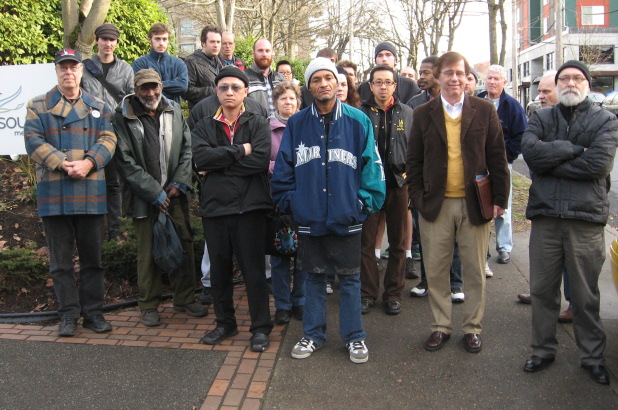
Not long before Christmas, Sound Mental Health (SMH), the property managers of downtown Seattle’s Kasota apartments, began going door to door in the building trying to get tenants to sign a new lease. SMH houses both mentally ill ‘clients’ and roughly seventeen low-income tenants at the Kasota, but the new lease seemed to indicate that they wanted that to change. The terms of the new lease for SMH’s non-client tenants included rent increases by as much as fifty percent. Many of the low-income residents of the Kasota are dependent on Social Security and other fixed incomes for survival and cannot afford to pay rent increases of this magnitude. They were outraged as it became apparent that the terms of the new lease would drive them from their homes and out into the street. For many residents, the new lease would mean desperation and homelessness. It was at this point that one tenant saw a Seattle Solidarity Network (SeaSol) poster and decided to start fighting back.
In their first meeting with SeaSol the tenants decided that if SMH wanted them out of the Kasota so badly, then they would make a pact: unless and until each and every one of them has received adequate relocation assistance, none of them will pay the increased rent or voluntarily vacate the building. Most felt that relocation would be the best solution, because the Kasota had gone downhill ever since SMH took over in spring of 2009. SMH had failed to make long promised improvements to the apartments, and there had been two fires and one flood during that time. While the tenants make it clear that they hold nothing against their neighbors, they do resent the fact that SMH has repeatedly failed to provide them with safe living conditions.
On December 28th eight Kasota tenants and twenty-two other SeaSol’ers formally delivered the tenants’ demand in mass at SMH’s offices on Capitol Hill. Two days later SMH posted notices on every tenant’s door promising to make much needed repairs, draw up new leases which would not raise the rent by more than 10%, and consider providing relocation assistance. Despite these conciliatory promises, the very next day SMH celebrated New Years Eve by retaliating against the tenants who had decided to fight back. SMH posted three-day Pay or Vacate notices on many tenants’ doors, even though only some of them actually owed any back rent. It would seem that SMH is moving to reconcile with one hand while reaching out to strangle with the other. Nonetheless, the tenants are standing strong and have told SMH to stop these intimidation tactics immediately and begin negotiating in good faith, or they will be forced to take further action in conjunction with SeaSol.
